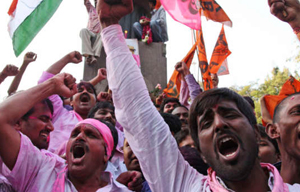 New Delhi, Feb 21: Andhra Pradesh is likely to be put under President's rule amid indications that a decision to this effect may be taken in the next couple of days.
New Delhi, Feb 21: Andhra Pradesh is likely to be put under President's rule amid indications that a decision to this effect may be taken in the next couple of days.
The state has been without a full-scale government after CM Kiran Reddy resigned on Wednesday to protest against the passage of the Telangana bill in Lok Sabha.
Sources, however, said it was clear that elections to new assemblies of Telangana and Andhra Pradesh may not be held along with Lok Sabha polls in May. The term of the assembly of undivided Andhra Pradesh runs out with that of the current Lok Sabha. But the fact that the House has now been split into two new assemblies — 175-strong one for Andhra Pradesh and a separate one with 119 for Telangana — may give the Centre and the Election Commission latitude to delay elections.
The leeway may suit Congress which has to work out the modalities of alliance, even a merger with Telangana Rasthra Samithi.
The two parties hope to sweep the 17 Lok Sabha seats in the Telangana region, arguably the sole driver for Centre getting into overdrive to partition AP after years of wavering and shuffling.
Political circles estimate that Congress may be able to persuade TRS boss K Chandrasekhar Rao to leave the overwhelming majority of LS seats in exchange for a higher share of assembly seats for the Telangana outfit.
Congress is still debating the pros and cons of a merger with TRS, with a strong school in the party feeling that the presence of a friendly Chandrasekhar Rao as an independent figure may help splinter the anti-incumbency sentiment.
Having been okayed by the two Houses, the bill will be sent by the home ministry to President Pranab Mukherjee for his assent. The presidential go-ahead will clear the way for a notification in the Gazette of India about the birth of Telangana as the 29th state of the Union. The gazette notification will also mention the day on which Telangana will be deemed to be born.





Comments
Add new comment